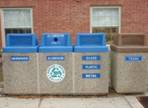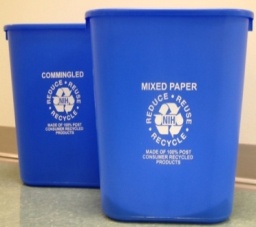The NIH Bethesda recycling program began in 1991, which involved collecting and recycling paper from two buildings on the Bethesda Campus. This program expanded to several other buildings in 1992.Montgomery County enacted business recycling regulations in 1993 that required all businesses to recycle paper products, cardboard, yard waste, and food and beverage containers made of glass, plastic, steel, and aluminum. These regulations resulted in the implementation of a full recycling program in 1996.
Recycling is mandatory in Montgomery County and is the responsibility of the employee.
View the
NIH Waste Disposal Guide page 14 for additional information and contacts.
Mandatory Recyclables
Recycle clean and dry paper, such as: newspaper, magazines, scientific journals, catalogs, post-it notes, manila folders, envelopes, tissue and paper towel boxes (not the actual tissues and paper towels), white or colored paper, frozen food boxes (not actual food), and paper board.
Flatten cardboard boxes and place near centralized recycling bins.
Can I recycle food containers?
Yes. The food containers must be made of recyclable material (plastic, paper, aluminum, etc.) and be clean. Please empty all containers of food waste and/or liquids before placing them into the commingled recycling bins.
Can I recycle Styrofoam?
The current Styrofoam program was re-initiatied in August of 2021from a similar program that was discontinued. A 30-foot pup trailer is used at the Building 10B2 South dock to accumulate and transport Styrofoam generated on the Bethesda campus. The NIH solid waste contractor has established a pick-up schedule to service each building on a routine basis. If a storage bin does not exist in your building, please contact Mansi Mehta to request a storage bin. This material will be transported and delivered to a processing facility where the material will be offloaded and densified for re-use. There are a few restrictions that follow this program's re-initiation, as discussed on the Additional Recycling page.
Is cardboard within Building 10 being recycled?
In Building 10, housekeeping collects cardboard in their blue carts. Once on the loading dock, the recycling crew separates the cardboard from the trash. Cardboard is a mandatory recyclable within Montgomery County. Businesses that have cardboard within their trash can be assessed a fine.
Are batteries recyclable?
Batteries are collected for recycling through Chemical Waste Services. Only batteries purchased with government money or used for work purposes should be recycled at the NIH. For batteries you have at home please contact your county services for disposal guidance. Links to county websites can be found under the Recycling at Home section.
The majority of items are recyclable, so what should be going in my trash can?
Items such as kleenex, wax paper, and styrofoam (other than ThermoFisher/Life Technologies coolers) should go in your trash can.
How do I recycle CDs and non-accountable electronics?
Non-accountable electronics should be sent through your Property Custodial Officer for your IC. This is the same person you send computers and accountable property to be disposed of. They will go to "surplus" and be sent to our R2 certified recycler for proper disposal. For more information you can call the Property Management Branch at 301-496-4247.
How much do the blue desk-side bins cost?
The blue desk-side recycling bins are available at no cost to employees on the Bethesda campus. It is your responsibility to empty the contents into the centralized recycling bins for collection. You can contact your green team leader or the Recycling Coordinator for more information.
How do I recycle personal cell phones?
Personal cell phones are coordinated by the Recreation and Welfare Association (R&W). Cell phone bins are located in various buildings around campus.
How do I recycle confidential documents?
Confidential documents should first be shredded. There are several shredding companies that institutes use to shred their documents. The U.S. Department of Health and Human Services, Program Support Center (PSC), Real Estate, Logistics, and Operations Support (RLO), provides shredding for federal agencies.
For more information about the PSC shredding program please call 301-443-6340 or visit their website at
https://www.psc.gov/psc-homepage-redesign/service-area/myservicedetails/building-operations-services/shredding.
What happens to NIH Bethesda recyclables?
Cardboard: Transported to Georgetown Paper Stock where it is baled and shipped to a mill to make new fiberboard for boxed items such as pizza, candy, and DVDs.
Toner Cartridges: Transported to Virginia where they are sorted, boxed, and shipped for remanufacturing.
Pipette Tip Racks: Shipped directly to a processor to be melted into black pellets. The pellets are shipped to a processor to make flowerpots.
Where are the recycling bins located?
-
Metal containers (picture above): Located near elevators, in hallways, and office suites
-
Outside containers: Located near parking lots and parking structures.
-
Blue desk-side bins: Can be used in your office cubicle or next to your lab bench. They are the size of a small trash can and collect mixed paper or commingled materials. Contact DEP at 301-496-7990 or ESI at 301-402-6349.
-
Hampers: Hampers are for collecting paper products from office clean-outs. Call 301-402-6349 to request delivery and pick-up.


